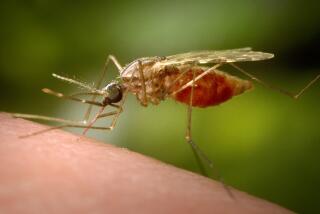Drug Can Prevent AIDS in Monkeys, Researchers Find : Health: Study of antiviral PMPA stirs excitement because primate experiments are thought to be good indicators of success in humans.
- Share via
A Belgian antiviral drug can prevent infection of monkeys with the primate version of the AIDS virus, suggesting that the drug could someday protect some individuals exposed to HIV, University of Washington researchers report today in the journal Science.
Separately, a team from the California Regional Primate Research Center in Davis has found that the experimental drug, called PMPA, can control established simian immunodeficiency virus infections in monkeys without prompting the emergence of resistant viral strains or displaying the toxicity of the AIDS drug AZT.
The findings have stirred excitement in the AIDS community because experiments in monkeys and other primates are generally considered the best indicators of potential for success in humans.
“Such complete protection with no toxicity is completely unprecedented in the monkey model of AIDS,” said Dr. Anthony M. Fauci, director of the National Institute of Allergy and Infectious Diseases.
Based on the findings, Gilead Sciences of Foster City, Calif., the drug’s distributor, is planning human trials of PMPA early next year.
When the Washington team got its first results with the drug, they seemed “too good to believe,” primatologist Che-Chung Tsai said. But after further studies, he concluded that “PMPA is the most effective drug we’ve ever seen” for attacking AIDS in monkeys.
Davis primatologist Koen Van Rompay’s assessment was remarkably similar to Tsai’s: “If I had not done the research myself, I would have doubted it.”
Like AZT and ddI, drugs now used to treat AIDS, the Belgian drug is a reverse transcriptase inhibitor--it blocks the action of an enzyme necessary for HIV to replicate in the cell. Discovered at the Rega Institute for Medical Research in Belgium, it is a chemical derivative of another drug, called PMEA, that is already in clinical trials.
Tsai was initially testing PMEA, but switched when studies showed that PMPA was only a tenth as toxic as the other drug--and only a hundredth as toxic as AZT.
Tsai and his colleagues injected 35 long-tailed macaques with an SIV dose sufficient to cause infection. Most of the monkeys received PMPA for four weeks, while 10 monkeys received none.
Eight months later, none of the monkeys treated with PMPA showed any signs of infection, while all 10 control animals displayed persistent infections. Although the researchers did not include AZT in the study, data from previous studies shows that it protected only 6% of those who received it before the infection and none of those who received it afterward.
Experts speculated that if the drug proves to have no harmful side effects in humans, it could be used to treat health care workers and others inadvertently exposed to the virus. Eventually, it might even serve as an alternative to an AIDS vaccine. Researchers have so far been largely unsuccessful in their efforts to develop such a vaccine.
Van Rompay and his colleagues reported last week at a meeting in Monterey, Calif., that they infected eight newborn rhesus macaques with SIV and treated four of them with PMPA, beginning three weeks later.
Six months later, all four treated animals were healthy and had low levels of SIV in their blood, while three of the untreated animals were dead and the fourth was severely ill.






